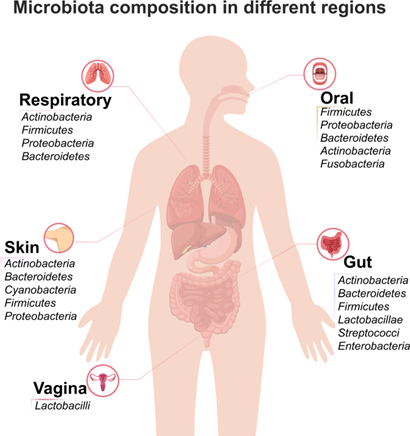Contribution of Microbiota in Health and Disease
- treyaghosh2
- Mar 9, 2025
- 4 min read
Trillions of bacteria live in our guts forming what we call gut microbiomes. They consist of bacteria, fungi, viruses, etc. They play vital roles ranging from imparting immunity, drug metabolism, and digestion. But it is not only gut where microbiota is found. They are also residents of our respiratory tract, skin, oral, and orbital cavity, etc. Together, all these resident microbiotas made up of trillions of different microorganisms encode over 3 million genes, which is way over the 21000 genes that humans have. These microbial communities exist in different types of relationships with the host, some symbiotic, some as commensals, or they could be opportunistic commensals and more. The symbiotic microorganisms carry a huge number of different beneficial activities that help in the proper functioning of the body. But there are some factors that may cause imbalances in the microbial communities which may lead to a variety of health issues and disorders. The changes in the balance of microbial communities are known as dysbiosis. There have been correlations found with disorders like diabetes, neurological conditions, like Parkinson’s, cancer, irritable, bowel syndrome, respiratory conditions etc. In this review, I aim to put together the current understanding of how microbial communities contribute to both good health and disease and further explore the potential clinical applications for treatments through microbiota modulation.
Importance of Microbiota
In healthy individuals, microbiota plays a significant role in maintaining homeostasis. These microbiotas perform an array of functions which include secretion of vital enzymes necessary for digestive processes, and at the same time for constant communication with our nervous system. This has further opened new research interest with the findings suggesting that gut microbiome roles are not only limited to digestive processes, but they largely influence our cognitive pathways leading to different mental health outcomes associated with neural degeneration. Scientists have also found that microbes have a significant role in the production of neurotransmitters that can have a significant role in the signaling pathways, potentially leading to various neurological problems, including depression and anxiety.
Another important role of microbiota is to fight against the deadly pathogens which may be responsible for producing various toxins and other factors leading to a host of diseases. They achieve this by competing for limited space, nutrients, and at the same time producing antimicrobial compounds. Through these mechanisms, they can prevent pathogenesis by maintaining a healthy balance between the resident microorganisms and the pathogens. Moreover, microbiota plays a notable role by maintaining key immune regulators, like the phagocytes, cytokines, chemokines, cytokines, and various other immune cells that can distinguish self-cells from the foreign antigens.
Dysbiosis
When homeostasis is disrupted in the microbiota population, pathogenic microorganisms may overgrow, decreasing the number of beneficial microbiotas. This condition is termed dysbiosis. Dysbiosis can result in various diseases and disrupt normal functions. One study indicates that dysbiosis can result in an imbalance in immune cells, upregulating inflammatory pathways, which have been shown to be associated with chronic inflammatory diseases like colitis, leaky gut syndrome, and obesity, among others. Disruption in gut microbiota has also been shown to worsen diabetes, progress cardiovascular diseases, and increase permeability in the intestinal epithelium, which may lead to the absorption of toxins and metabolic waste products into the bloodstream.
Current Research Findings and Interventions
Understanding the role of microbiota in human homeostasis has led to various approaches for clinical interventions. One approach to restore healthy microbiota in patients with dysbiosis has been Fecal Microbiota Transplantation (FMT), which involves the transfer of stool from healthy individuals to a patient. This treatment has yielded promising results for several inflammatory and autoimmune diseases like colitis, irritable bowel syndrome, Crohn’s disease, food allergies, and many more.
Another field called pharmacomicrobiomics has emerged, studying the interaction of various drugs with the resident microbiomes. This technique is since gut flora differs from one individual to another. Based on this, an overall sampling of the resident microbiome is done, and a personalized treatment approach is developed for effective outcomes.
Finally, one of the most common approaches to maintaining a healthy gut microbiota balance is through the consumption of probiotics and prebiotics. This approach restores healthy microbial balance in the gut and restores immunoregulatory functions.
Conclusion
The intricate interaction between microbiota and human health emphasizes the importance of maintaining a balanced microbial community. While microbiota contributes significantly to homeostasis and immune regulation, dysbiosis can lead to various diseases. Understanding the intricate mechanisms behind microbiota's impact on health and disease opens new frontiers in medical research and treatment. As research continues to evolve, the potential for microbiota-based therapies to revolutionize healthcare becomes increasingly evident.
References
Shreiner, A. B., Kao, J. Y. & Young, V. B. The gut microbiome in health and in disease. Curr. Opin. Gastroenterol. 31, 69–75 (2015).
Laterza, L. et al. The gut microbiota and immune system relationship in human graft-versus-host disease. Mediterranean J. Hematol. Infect. Dis. 8, 2016025 (2016).
Auchtung, T. A. et al. Investigating colonization of the healthy adult gastrointestinal tract by fungi. mSphere. 3, e00092–18 (2018).
Lau, K. et al. Bridging the gap between gut microbial dysbiosis and cardiovascular diseases. Nutrients. 9, 859 (2017).


Comments